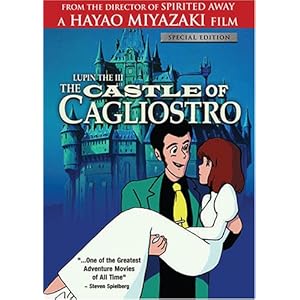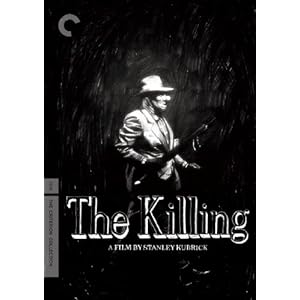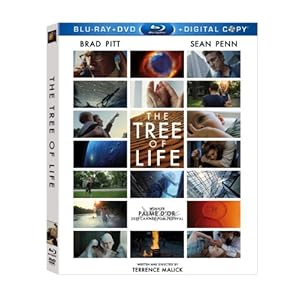Well, here we are again.
The Castle of Cagliostro

Hayao Miyazaki's first film as a director, before Studio Ghibli was a thing, is based on the Lupin III television series he worked on, which was based on a manga created by Monkey Punch, which was inspired by the Arsène Lupin character created by Maurice LeBlanc. The film's plot is also based on one of the original Lupin stories. So yeah, there's a lot of adapting going on here. Cagliostro is a lighthearted action adventure about Lupin and his buddies stumbling on the world's biggest counterfeit currency operation in one of its smallest countries, and trying to both thwart their plans and rescue a princess at the same time. I've only seen a bit of the show, but it doesn't take much of that to get familiar with the principal characters, and they all show up here and have fun little parts to play. It's a simple movie, but there's a nice energy to it, a reasonable amount of excitement in the twists and turns, and like all works by Miyazaki there's a nice feeling to the animation, which isn't the most fluid ever but does what's required to set the right tone. It's kind of a standard adventure movie, but it's a well executed one.
Killer's Kiss

Not Stanley Kubrick's first feature film, but the first that's readily available for public consumption. It's also his weakest that I've seen. There's nothing very bad about the movie, but there's just not much to it. A boxer meets up with a dancing girl, and they try to leave the city and start a life somewhere, but her crook of a boss isn't a fan of the idea. It's a pretty bare-bones noir story, with the only thing that really makes it work being Kubrick's great photography. There's lots of great little shots that stick out as distinct for the era, including use of reflections, some stuff with shadows that I haven't really seen before, and a memorable conclusion in an unusual setting. There's not much to the characters though, and the tacked-on ending doesn't really work. Its only real use is to show the potential Kubrick had for his work later on.
The Killing

The very next year Kubrick made this, his first really good movie. It actually feels a bit less distinctly his than Kiss, but it's certainly a lot more fun to watch, and might actually be the most purely enjoyable movie he ever made. In one of the few instances I can think of of him using an actor more than once, he has Sterling Hayden as the main character, a criminal trying to pull off one last job, robbing the take at a horse track, with a complicated scheme that involves multiple people both inside and outside the place. It's a pretty good plan, though there's also a lot of moving parts, and of course things get screwed up and the situation eventually gets pretty hairy. There's a lot of build up, and the pay off when it all starts falling into place is pretty great. Stylistically, there's not much in the movie that wouldn't be in another noir movie from the period. But it's also just a really good example of the genre, and sometimes that's all you need to be successful.
The Tree of Life

This is a film about life, and growing up, and pretty much everything that entails. I said before that I imagine a film by Terrence Malick entirely in his reflective/observing-nature's-beauty mode might get tedious, and that's somewhat true here, but the film is so beautiful and poignant that it's hard to be really bothered by the slow bits. The film isn't exactly in chronological order, but what it's basically about is Sean Penn remembering his youth growing up with his parents and two brothers, and also experiencing some sort of vision of the birth of the universe and what possibly lies beyond it. It's a staggeringly gorgeous movie at times, especially in the scenes showing the early moments of existence, with visuals that avoid computer animation in favor of more natural means. The more normal stuff looks great too, though it's mostly just people walking through houses or the woods. Brad Pitt plays his father, and does a really great job making him into a terrible dad that should really be feared and despised without being over the top about it. Just the way he touches his sons on the neck is enough to establish that loving parenting doesn't come naturally to him. I don't think the movie needed a name like Penn to play the adult version of the main character though - he doesn't really do much acting besides walking around and looking at things. The Tree of Life is a bit ponderous and in love with itself at times, but what it does right is memorable and unique enough to make the film worth watching, especially if you're a fan of film as a visually artistic medium.
AAAAAGGGHHHH
16 years ago


































No comments:
Post a Comment